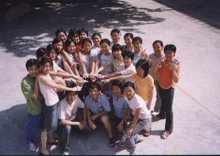Tongue twisters are often a challenge to eager students but occasionally, teachers get students who pour acid down on such so called ‘kindergarten’ approach. How does one prove to unconvincing students on the effectiveness of tongue twisters for improving speaking?
One way is to change their mindsets. I often tell the story of how Winston Churchill, who despite his lisp and stammer rose to be a world renowned orator. (I read his story umpteen years ago in Reader’s Digest).
Then I tell them how some of the best Hollywood actors recite tongue twisters to help them perform their lines more fluency. Following which, I bring home the point that if native speakers need tongue twisters to improve their speaking, how much more learners of the language.
To further impress my unenthusiastic students, I would explain the role of the tongue when we say certain English alphabets. For example, the different positions of the tongue when we utter the sounds of ‘l’ ‘r’ ‘th’ and ‘t.
When I present ‘Betty Baker’ in class, I give both the British and American rendition to emphasize the differences between British and American English. You will find that once students are convinced of the helpfulness of tongue twisters to their speaking, they will become more eager.
There are different versions of the Betty Baker tongue twister. This is the one I use.
“Betty Baker bought a bit of bitter butter to bake a bit of bitter butter cake
A bit of bitter butter cake did Betty Baker bake.”
Tuesday, May 15, 2007
Subscribe to:
Post Comments (Atom)

No comments:
Post a Comment